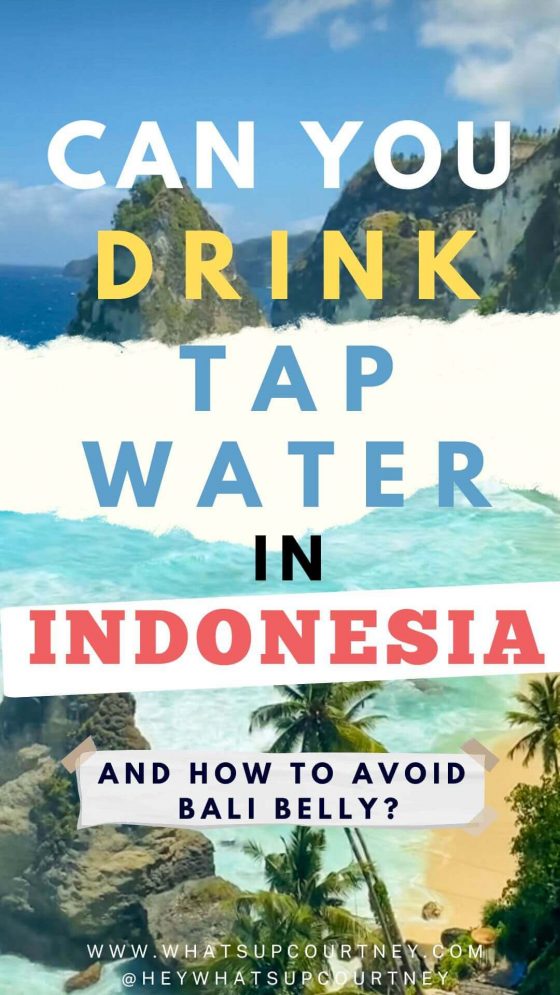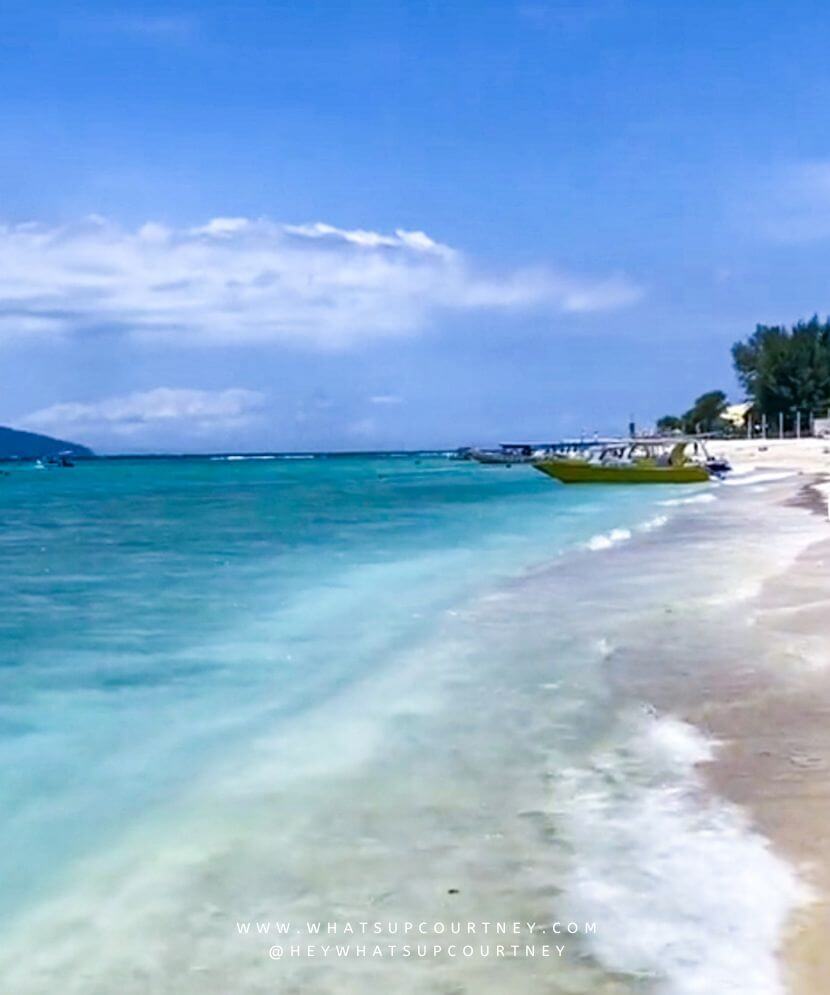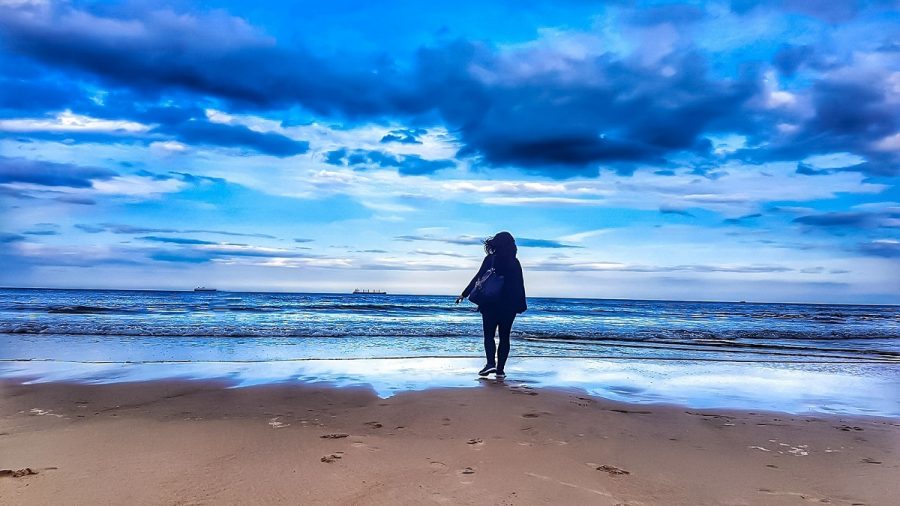You have booked your dream holiday and heading to Bali Indonesia and other islands (and you should!). If you’re travelling to Indonesia, and yes Bali is included, you’ve likely been wondering –
Can you drink the water in Indonesia? The answer is NO! Seriously please don’t. Indonesian tap water isn’t safe for human consumption: not for locals and not for visitors.
Growing up in Jakarta, Indonesia, my parents and my family have never drunk unfiltered tap water straight out of the tap, I obviously have not drunk any tap water in Indonesia either.
So what can you do as a visitor travelling here and steps to hopefully avoid Bali Belly?

Can you drink the water in Indonesia?
How do the locals drink the water in Indonesia?
Living in Jakarta Indonesia throughout my childhood was the best and so different now that I am living in the UK. Growing up we would always have a water delivery “Aqua” in these large drums. They’d get delivered either once a week or when we need them, and they would come delivered either by a truck or at times on a motorbike. Wash the drums as soon as it’s delivered because cleanliness is important.
The water drum is then placed onto a water dispenser and would fill our water needs for that week, of course it depends on your water consumption.
When we go out or for school, I would almost always carry a water bottle with me filled with my Aqua water. If not, there’s always a water dispenser in school to top up or purchase bottled water from the shop. Never ever will I or my friends drink tap water from the toilet or anywhere.
For brushing our teeth and other water consumption, my family has installed a filter water system which helps a lot but my mum still boils the water for certain things. It does help with brushing teeth though.

Why can’t you drink the Tap Water in Indonesia
The quality and safety of the tap water can vary significantly across different regions, but in the majority of cases, it is not considered safe for consumption.
From what I understand, the tap water in Indonesia is often sourced from surface water like rivers and lakes, which can contain a range of contaminants, including bacteria, viruses, and other impurities. While the water may undergo some level of treatment, the processes are not always sufficient to make the water potable based on international standards.
Even in major Indonesian cities, the tap water distribution and treatment systems may not be up to par. The water can contain high levels of minerals, chemicals, and microorganisms that can cause illnesses such as traveler’s diarrhea, typhoid fever, hepatitis, and other waterborne diseases.
Can you drink the water in Bali?
Can I drink tap water in Bali Indonesia?
When it comes to the island of Bali, the situation is similar to the rest of Indonesia because Bali is in Indonesia. The tap water quality in Bali is not considered safe for drinking. While there may be some pockets or higher-end areas with better water treatment, the overall consensus is that the tap water in Bali should be avoided for direct consumption.
Please don’t do it, you will risk getting the infamous Bali Belly as they call it or worse, typhoid.
Bali’s water sources, like the rest of Indonesia, are often surface water that can be contaminated. The water treatment and distribution infrastructure on the island may not be adequate to ensure the water is free of harmful contaminants.
What can you do as tourist/traveler when visiting Bali and other parts of Indonesia?
1. Bottled Water: Purchasing sealed, branded bottled water is the safest and most convenient option. Reputable bottled water brands are widely available throughout Indonesia, including Bali. And make sure the seal is intact! The most popular brand is Aqua. You can buy from road sellers, convenient shops, and of course supermarkets – the price may vary between all of them but not too much.
2. Filtered Water: Some higher-end hotels, restaurants, and cafes in Indonesia may have water filtration systems in place to provide potable drinking water. However, the quality and efficacy of these filters can vary, so it’s important to inquire about the filtration process.
3. Boiled Water: Boiling tap water can help kill some, but not all, potential contaminants. While boiling water is better than drinking it raw, it may not remove all harmful substances.
4. Purified Water: You could try water purification tablets, UV purifiers, or other filtration devices can be used to treat tap water and make it safer for drinking. These can be especially useful for those staying in more remote or rural areas.
5. Bottled Water Delivery: As mentioned before, you can arrange for large galons of purified drinking water to be delivered directly to your accommodation.
6. Bring your own Bottle of water: If you can carry it in your bag or hold it, this is an easy and safer way of ensuring you have water on the go or when you travelling around Indonesia, Bali included for sightseeing. Buy more bottled water or find an aqua dispenser to refill.
Side note: You can get these window mosquito guard to help prevent mosquitos from coming in or flies. They can be a pest.
Is it safe to have drinks with ice?
I mean after the long discussion of saying how tap water is not safe in Bali, Jakarta and rest of Indonesia, it is understood that you’ll be worried about the ice. However, in hotels or cafes and restaurants, it is generally OK to have the ice as they probably use the filtered water. When in doubt or if you have sensitive stomach then it’s best to always ask the place you are having the drink about their ice, if you are happy with it then have it.
How can I prevent Bali belly?
Bali Belly it is now famously known can be quite common. I suppose it depends on how sensitive your stomach is, and it is generally not only because of food and drinks consumption but it can be from your swimming pool or the beach. Just be cautious and use hand sanitiser, and wash your hands when you can. Use filtered or bottled water to brush your teeth and be careful not to get too much water in your mouth when showering, swimming or from the local pools or temples etc.
As tempting as the stray animals are to pet, they are not always the cleanest, and if you eat food after petting them without washing you hands can also add to the Bali belly.
Please do eat street food in Bali and anywhere in Indonesia, if you are weary of them, ask them to cook it extra well and its cooked through. Indonesia Street food and snacks are one of the best things to try and do in Indonesia!
Use common sense, always be respectful and have a great time on your trip!
Courtney xx





Leave a Reply